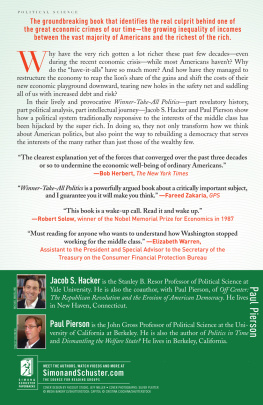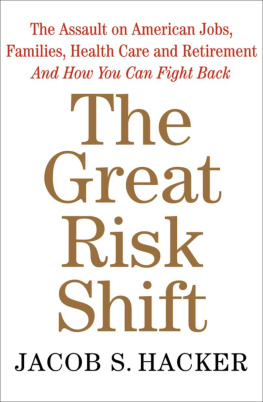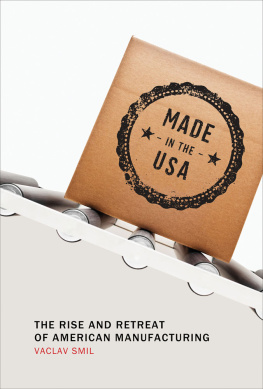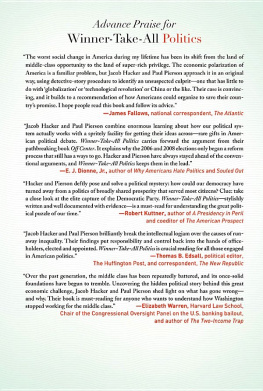
HAROLD SHAPIRO
JACOB S. HACKER is the Stanley B. Resor Professor of Political Science and Director of the Institution for Social and Policy Studies at Yale University. He has appeared recently on PBS NewsHour, NBC, All Things Considered, and Marketplace. He lives in New Haven, Connecticut.

JENNIFER GRAHAM
PAUL PIERSON is the John Gross Professor of Political Science at the University of California at Berkeley. His commentary has appeared in The New York Times Magazine, The Washington Post, and The New York Review of Books. He lives in Berkeley, California.

MEET THE AUTHORS, WATCH VIDEOS AND MORE AT
SimonandSchuster.com
authors.simonandschuster.com/Jacob-S-Hacker
authors.simonandschuster.com/Paul-Pierson
ALSO BY JACOB S. HACKER AND PAUL PIERSON
Off Center: The Republican Revolution and the Erosion of American Democracy
Winner-Take-All Politics: How Washington Made the Rich RicherAnd Turned Its Back on the Middle Class
ALSO BY JACOB S. HACKER
The Great Risk Shift: The New Economic Insecurity and the Decline of the American Dream
The Divided Welfare State: The Battle over Public and Private Social Benefits in the United States
The Road to Nowhere: The Genesis of President Clintons Plan for Health Security
ALSO BY PAUL PIERSON
Politics in Time: History, Institutions, and Social Analysis
Dismantling the Welfare State? Reagan, Thatcher, and the Politics of Retrenchment

Simon & Schuster
1230 Avenue of the Americas
New York, NY 10020
www.SimonandSchuster.com
Copyright 2016 by Jacob S. Hacker and Paul Pierson
All rights reserved, including the right to reproduce this book or portions thereof in any form whatsoever. For information, address Simon & Schuster Subsidiary Rights Department, 1230 Avenue of the Americas, New York, NY 10020.
First Simon & Schuster hardcover edition March 2016
SIMON & SCHUSTER and colophon are registered trademarks of Simon & Schuster, Inc.
For information about special discounts for bulk purchases, please contact Simon & Schuster Special Sales at 1-866-506-1949 or .
The Simon & Schuster Speakers Bureau can bring authors to your live event. For more information or to book an event, contact the Simon & Schuster Speakers Bureau at 1-866-248-3049 or visit our website at www.simonspeakers.com.
Interior design by Ellen Sasahara
Jacket photo by Pete Muller and Shutterstock
Jacket design by Faceout Studio, Derek Thornton
Library of Congress Cataloging-in-Publication Data is available.
ISBN 978-1-4516-6782-0
ISBN 978-1-4516-6784-4 (ebook)
To Our Teachers
CONTENTS
INTRODUCTION

Prosperity Lost
T HIS BOOK is about an uncomfortable truth: It takes governmenta lot of governmentfor advanced societies to flourish.
This truth is uncomfortable because Americans cherish freedom. Government is effective in part because it limits freedombecause, in the language of political philosophy, it exercises legitimate coercion. Government can tell people they must send their children to school rather than the fields, that they cant dump toxins into the water or air, and that they must contribute to meet expenses that benefit the entire community. To be sure, government also secures our freedom. Without its ability to compel behavior, it would not just be powerless to protect our liberties; it would cease to be a vehicle for achieving many of our most important shared ends. But theres no getting around it: Government works because it can force people to do things.
The authors of the US Constitution were keenly aware of this fact. Eleven years after the Declaration of Independencewith its ringing declaration of certain unalienable rights and its clear-eyed recognition that to secure these rights, governments are instituted among menfifty-five American notables gathered in Philadelphia because they had become convinced that the absence of effective public authority was a mortal threat to the fledgling nation.
But Americans have never been good at acknowledging governments necessary role in supporting both freedom and prosperity. And we have become much less so over the last generation. We live in an era of profound skepticism about government. Contemporary political discourse portrays liberty and coercion as locked in ceaseless conflict. We are told that government is about redistribution and the private sector about production, as if government only reshuffles the economic deck rather than holding many of the highest cards. We are told free enterprise and big government are engaged in a fierce zero-sum battle (one sides gain is the others loss), when, in fact, the modern partnership between markets and government may well be humanitys most impressive positive-sum bargain (making both sides better off). We are told that the United States got rich in spite of government, when the truth is closer to the opposite: The United States got rich because it got government more or less right.
We suffer, in short, from a kind of mass historical forgetting, a distinctively American Amnesia. At a time when we face serious challenges that can be addressed only through a stronger, more effective governmenta strained middle class, a weakened system for generating life-improving innovation, a dangerously warming planetwe ignore what both our history and basic economic theory suggest: We need a constructive and mutually beneficial tension between markets and government rather than the jealous rivalry that so many misperceiveand, in that misperception, help foster. Above all, we need a government strong and capable enough to rise above narrow private interests and carry out long-term courses of action on behalf of broader concerns. At the Constitutional Convention in 1787, one of the delegates noted: It has never been a complaint of [the Confederate Congress] that they governed overmuch. The complaint has been that they governed too little.there are complaints only about our leaders governing overmuch. But the truth is that although areas of government overreach certainly do exist, we have too little effective government, not too much.
We recognize that these words are likely to provoke doubt, if not disbelief. We ask only that these reactions be suspended long enough to consider the evidence. Fortunately, it is close at hand: in our nations history and in the history of every nation that has transited from poverty, sickness, and mass illiteracy to wealth, health, and enlightenment. Still, the forgotten roots of our prosperity are well buried. We have to dig deeply into the debris left behind by nearly a half century of ideological warfare to unearth the economic model thatin remarkably short order, beginning little more than a hundred years agomade us the richest nation the world has ever seen.
Why Markets Need Government
Like other advanced democratic nations, the United States has what economic analysts call a mixed economy. In this public-private arrangement, markets play the dominant role in producing and allocating goods and innovating to meet consumer demand. Apple brings us iPhones, and it earns sizable profits by doing so. Visionaries such as Steve Jobs see untapped opportunities to make money by satisfying human wants, and then draw on the knowledge and technology around them to produce goods and services for which people are willing to pay. Markets are the most powerful institutions yet developed to encourage and coordinate decentralized action in response to individual desires.
Next page












